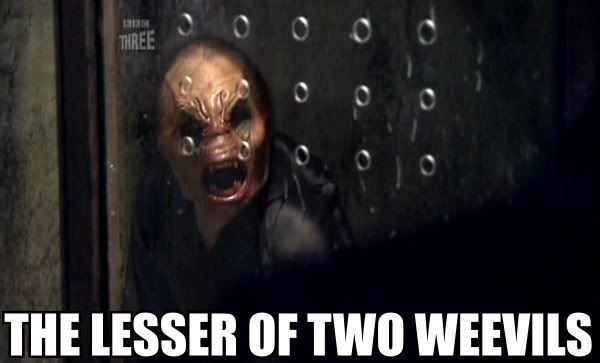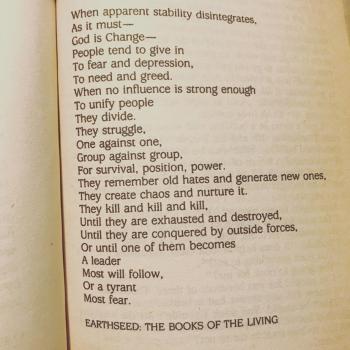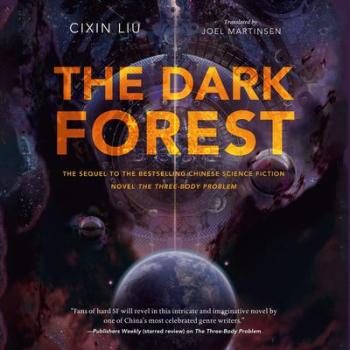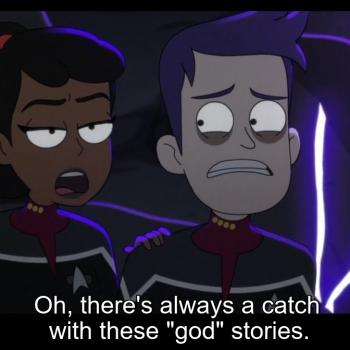The episode “Combat” revolves around the Torchwood team’s investigation into a mysterious group that has been capturing weevils and in some way causing or allowing other human beings to be harmed or killed by them.
 The episode, for most of its duration, might well have seemed to have little that is of direct interest to someone concerned with the intersection of religion and science fiction. But as Owen’s investigation brings him into contact with Mark, major religious overtones begin to appear, and religion is even explicitly mentioned. “What’s the point of your life?” Mark asks Owen. Later he says, “We’re a generation of no faith. In society, in religion, or in life. All we can do is reduce ourselves to the basics.”
The episode, for most of its duration, might well have seemed to have little that is of direct interest to someone concerned with the intersection of religion and science fiction. But as Owen’s investigation brings him into contact with Mark, major religious overtones begin to appear, and religion is even explicitly mentioned. “What’s the point of your life?” Mark asks Owen. Later he says, “We’re a generation of no faith. In society, in religion, or in life. All we can do is reduce ourselves to the basics.”
An echo of the earlier episode “They Keep Killing Suzie” with its focus on the afterlife or lack thereof is found in Mark’s words, “Something’s out there in the darkness. Something’s coming.”
Mark’s suggestion that weevils might be the descendants of humans, thousands of years in the future, when “all that we have left is our rage,” is striking. Looking into a weevil’s eyes is compared to looking into the dark recesses of one’s own soul.
The depiction of creatures that are humanoid in appearance, and yet seem to be driven by pure unbridled rage, hatred or hunger, is quite common in sci-fi. Science fiction has a long history of looking at the darker side of human existence, of extracting one aspect of human existence – positive, negative or a mixture of the two – and projecting it onto a fictional alien entity that has just that characteristic and not other contrasting ones. But what, if anything, do we learn from doing so?
Gwen’s seeking of forgiveness from Rhys, telling him of her affair with Own after giving Rhys an amnesia drug, is also noteworthy. The phrase “forgive and forget” is widely used, and yet the truth is that we find it hard to do both, and we all wish at times that we could not simply be forgiven, but also erase the very memory of what we did wrong from another’s mind. We desire the other person to know and forgive. We also desire for them to forget. And the moral issues involved with trying to make someone forget may be ones that real life technology may one day require us to deal with.
 Owen’s statement that, in the cage with a weevil, for a moment he felt totally at peace, suggests that human beings, with our myths of primal or primeval innocence, are somehow aware that there is a serenity to the sort of animal existence that kicks in during combat, sex, and other activities that are universal among higher organisms. A moment of peace can be achieved, however fleeting, in allowing those primal instincts to take over for just a moment.
Owen’s statement that, in the cage with a weevil, for a moment he felt totally at peace, suggests that human beings, with our myths of primal or primeval innocence, are somehow aware that there is a serenity to the sort of animal existence that kicks in during combat, sex, and other activities that are universal among higher organisms. A moment of peace can be achieved, however fleeting, in allowing those primal instincts to take over for just a moment.
Perhaps our sense of loss of innocence is a result precisely of our ability to reflect afterwards on what we have done and on the consequences.
We long for the peace that comes with momentarily abandoning that conscious, reflective thought. Yet we are horrified by the thought of being pure rage alone. And so we find outlets for our instincts that will not upset the delicate balance of civilization. We create weevil fight clubs. We live our lives at the intersection of what classically has been referred to as the flesh and the soul.
And yet it seems that however much pain and angst and regret accompanies such existence, we really would not want to have it any other way.













